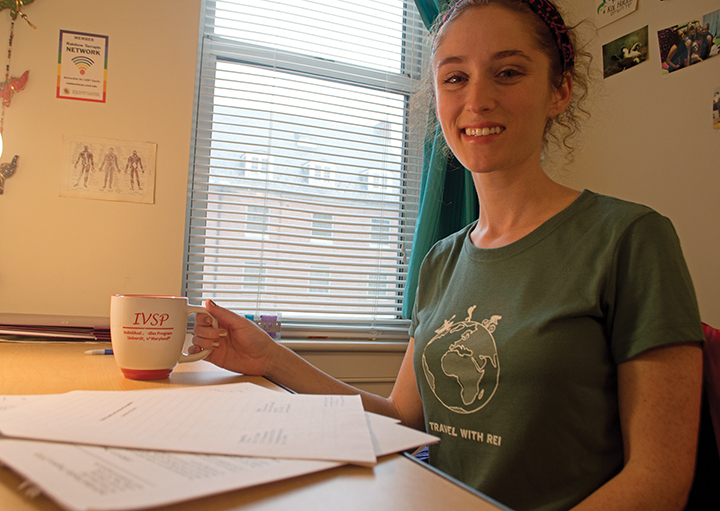
Tal Lee wanted to be versed in more subjects than biology before she applies to medical school and becomes a physician. To do so, she applied to the individual studies program and created her own major: public health and structural inequalities.
By the middle of her sophomore year, Tal Lee had gone through at least five majors.
First she was in the engineering school, which she switched out of before even starting classes. Then biology. Dance. Dietetics. Community health.
The problem wasn’t that she didn’t know what to do. She had a post-college plan: get her master’s degree in public health and then go to medical school to become a physician. She knew what she was interested in but couldn’t find one major to fulfill everything she wanted to study: the biology of well-being but also other components that go into wellness, including sociology, mental health and access to health care.
Lee, now a junior, said all this knowledge would be important to her in her future career.
“I really believe physicians should be trained in cross-cultural competency as well as communication,” she said.
One day, she found the website for the individual studies program at this university that allows students to create their own interdisciplinary majors. Lee went through the application process, eventually creating and declaring her own major: public health and structural inequalities.
Lee is among several students at this university and across the nation who are choosing to create their own majors. They have different passions and goals, but they are all finding they have interests more diverse than the areas of study their respective schools offer.
In some cases, this decision to take an unconventional approach might give them an advantage.
An independent studies program “encourages students to take initiative in their education and development, something they don’t have to do by following a prescribed major,” said Patrick Civello, the interdisciplinary studies adviser at University of California, Berkeley. “Also, an interdisciplinary perspective can be illuminating, especially to the blind spots within specific disciplines.”
At this university, the process of declaring an interdisciplinary major is rigorous. Students must be able to defend chosen majors and explain why it would not be possible to achieve the same learning objectives with any of the majors and minors the university already offers, said individual studies Program Director Joan Burton. The degree candidates must choose their curriculums and write proposals explaining their majors, which they then must defend in front of a board of faculty advisers who will decide whether to accept the new major.
The individual studies program offers workshops to aid students in creating their proposals — the first one for this semester was Monday, but more will take place weekly until May 1, and each student has a faculty mentor with similar interests who guides them through the process.
For Lee, the proposal process was immensely important. She said her final proposal was about 20 pages and went through at least five drafts.
“My major is accredited by the state of Maryland, which is huge, so I take pride in my proposal,” she said.
Burton said the students who tend to follow this path are both self-motivated and proactive.
“They’re extremely diverse. They have all kinds of passion,” she said. “But they share a willingness to think outside the box, a willingness to take hold and own their education, a real desire to make an education that is meaningful for themselves in a very individual way.”
They come for different reasons. Some students in the program, such as Lee and 2013 graduate Julia Kohler, know exactly what they want to do after graduation and hope to tailor their undergraduate degrees to match those future plans. Kohler planned to apply to a master’s program targeting urban education, so her undergraduate degree became health education reform.
“Because of [the advisers], I was able to formulate ideas, put them on paper and actually hold myself accountable,” Kohler said.
Some, such as 2013 alumnus Dan Granot, want to make all their interests work together. Before declaring his individual studies major in global development, Granot was juggling two majors and two minors. When he tried to pick up one of the business majors, he realized there had to be a better way of studying everything he enjoyed.
Granot said he thinks the skills he learned through his individual studies major helped him excel after graduation and to be accepted into Georgetown University’s master of science in foreign service program.
“This program is the top-ranked [international relations] school, and something that, without a self-developed degree, I would have never been accepted to,” he said.
Becky Zorn, a 2010 individual studies graduate who studied international relations, said she was able to take certain opportunities, such as studying abroad and working two internships, that she wouldn’t have been able to experience had she not made her own degree.
The ability to study three different languages has already proved immensely useful in her postgraduate jobs, she said.
“I felt empowered in my studies, loved most of the courses I took and worked hard to graduate with solid grades in addition to strong professional experiences,” Zorn said. “The combination of the two proved extremely important when I searched for jobs after graduation — and found a job immediately.”
Burton said students tend to find success with potential employers and graduate programs because they learn early on in the proposal process how to sell themselves.
“We really feel it’s a privilege to work with these students,” she said. “I feel like every one of them is going out in the world to make a positive change.”



